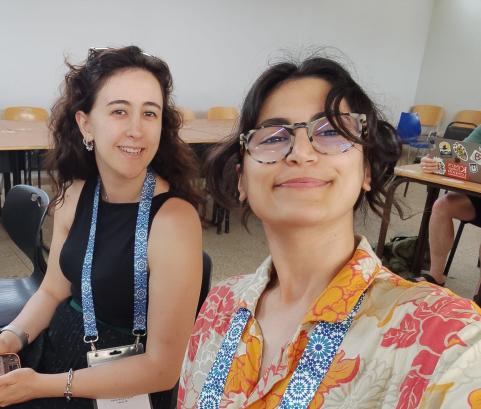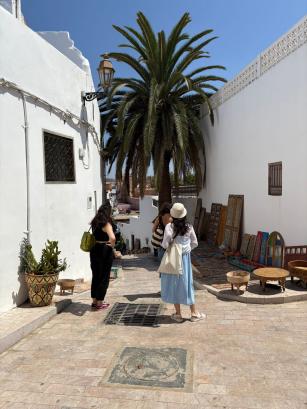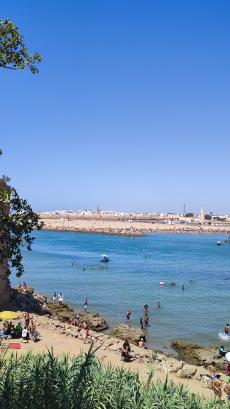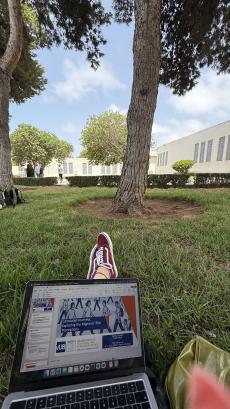29/07/2025, By Fatıma Silpagar & Tulya Su Guven
From 6 to 11 July 2025, over 4,600 sociologists and social scientists from 101 countries gathered at the Université Mohammed V de Rabat in Rabat, Morocco, for the 5th ISA Forum of Sociology. With the timely theme of 'Knowing Justice in the Anthropocene', the Forum provided an opportunity to explore justice at various scales and through different perspectives, ranging from personal experiences to structural changes. It was a place where local and global concerns, historical contexts, and emerging futures intersected and informed one another.
This was, as ISA President Geoffrey Pleyers noted in his welcome address, “the first time a major ISA event is held in the Arab world and the MENA region.” He emphasized that “learning from and with our colleagues from this region and including more experience, research and knowledge from these countries will contribute to a better and more global understanding of the challenges of our times.” The Forum’s location was not just symbolic, but it also reflected a broader effort to decentralize sociological knowledge and to support, as Pleyers put it, “a sociology rooted in different cultures, historical contexts and linguistic areas.”

The theme resonated deeply with us as co-authors. We, Fatıma and Tulya, both researchers at BRISPO, came to the Forum with distinct but complementary perspectives. Tulya, alongside Veerle Buffel, presented her paper "From Gaps to Groundings: Reimagining Migrant Integration through a Socio-Spatial Integration Lense". Her work is a hybrid review which explores how socio-spatial dynamics shape the sense of integration and everyday well-being of newcomers. Examining how place, social networks and belonging intersect to influence migrants' well-being, the paper argued for a new theoretical approach to achieve a more grounded and comprehensive understanding of socio-spatial integration. Fatıma, together with Tuba Bircan, presented "Calculated Journeys: Exploring the Migrants’ Risk Perceptions", a mixed-methods study that challenges the stereotype of migrants as impulsive risk-takers. Her research highlights how migrants approach major life decisions with strategic planning, caution, and strong reliance on social networks.
This post is both a co-authored reflection on our time in Rabat and an attempt to capture how we experienced the Forum as junior researchers coming from different backgrounds and research interests.
The Forum
The overarching theme of this year's ISA Forum was 'Knowing Justice in the Anthropocene', with the emphasis placed not only on the Anthropocene itself, but also on knowledge. The term 'Anthropocene' is inherently complex and loaded and is still the subject of much debate. It often evokes environmental connotations, and at its core, this new epoch is defined by the irreversible impact that humans have made (and continue to make) on our planet.
With this vast and deeply complex theme as its backdrop, the Forum of 2025 started with these core questions:
“What does it mean to “know” in the context of the Anthropocene?
Whose knowledge counts?
What forms of knowing are prioritized, and with what consequences, in societal change?
How do we know what is fair and just? Can we forge new understandings of justice for the Anthropocene?
The goal was to invite us researchers to reflect on the role and potential of sociology, as well as our responsibilities in addressing and contributing to all forms of ontological and epistemic justice, whether environmental, social, legal, ethnic or interspecies. Given the scale and scope of the Forum, it indeed enabled such reflections to emerge from across the globe, from New Zealand to Taiwan, Poland to India, Peru to the USA. Researchers from all over the world presented unique and shared experiences of injustice in many forms.
The ongoing occupation and genocide in Palestine, where nearly all forms of injustice intersect, is perhaps the most prominent and urgent example of injustice in our present time. It was thus a recurrent topic not only in many panels, but also in conversations between sessions, in the hallways, and during lunch breaks. This context also informed a call for a boycott of the Forum, addressed by the ISA in a public statement which acknowledged the concerns and reaffirmed its commitment to dialogue and academic freedom.
Sessions that Stood Out
The program was extensive, featuring 57 Research Committees, 5 Thematic Groups, and 5 Working Groups. Naturally, it was impossible to attend all the panels of interest as there were so many, and they often overlapped. As researchers focusing on the socioeconomic, cultural and demographic dimensions of social inequality and migration in particular, we would like to reflect on the panels we participated in, especially those held under RC21 (Regional and Urban Development) and RC31 (Sociology of Migration). We also wish to highlight other panels that sparked interdisciplinary dialogue and inspired us.
Our Contributions
Fatıma:

Two panels in particular stuck with me for the way they bridged methods, theory, and lived realities.
Empirical Applications of Decision-Making Models approached individual behavior through the lens of rational choice and game theory, offering a structured yet varied exploration of how decisions are made under conditions of uncertainty, constraint, and interaction. The session demonstrated how wide-ranging this framework can be applied to questions of various contexts. One particularly memorable paper analyzed Tsunami-Tendenko as a case of super-rational behavior in collective survival scenarios, while another examined public responses to gender-based violence through a vignette experiment. The panel revealed how theoretical tools like rational choice do not limit inquiry, but they can open up rich insights into how individuals act within socially patterned constraints.
Gendered Outcomes of Migrants and Their Descendants in the Labour Market zeroed in on how migration histories and gender intersect in shaping occupational attainment across generations. The opening paper, drawing on multi-site and intergenerational data, underscored how structural opportunity, family resources, and gendered expectations travel across borders and across time. It was very interesting to see how these dynamics play out across national contexts while revealing shared patterns of inequality and persistence. It pushed me to think more critically about how labour market structures reproduce belonging and exclusion, and how gender continues to shape migrant outcomes long after settlement.
I presented in the session Migration, Risk and Uncertainty I, which was part of a two-part series bringing together researchers exploring how migrants experience, negotiate, and respond to risk and uncertainty in different contexts. In my paper, I challenged the dominant narrative of migrants as impulsive risk-takers. Drawing on a mixed-methods approach, combining qualitative focus groups with a multilingual survey conducted in Belgium, I highlighted how migrants, particularly when making education and career decisions, plan cautiously and strategically. Many rely on social networks and digital platforms to reduce uncertainty and improve their chances of positive outcomes. The session as a whole was incredibly rich, with contributions covering migration experiences from the Maghreb, the Philippines, and the Balkan route. I’m especially grateful to our chair, Francesca Messineo, for her thoughtful moderation and ability to weave connections across diverse presentations. Presenting in such a diverse international setting was both humbling and energizing.
Attending Migration, Risk and Uncertainty II the following day deepened the conversation even further. The session included work on family migration laws in Morocco, gendered remigration strategies in China, and the emotional toll of forced migration from Syria. These contributions foregrounded the emotional, legal, and institutional dimensions of risk in ways that were deeply resonant. Together, the two sessions offered a nuanced and multifaceted understanding of risk, not as a singular or uniform experience, but as something profoundly situated, relational, and contextual.
Tulya:

Among the many thought-provoking sessions at the Forum, a few stood out to me for their depth and resonance. The panel 'Impossible Grief: "Bereavement and Death Practices Around Lives That Don't Matter" (hosted by RC 22 - Sociology of Religion) offered a powerful exploration of mourning practices for lives deemed ungrievable, be they migrants, political martyrs, or those labeled as terrorists, highlighting how even grief itself is subjected to injustice and is shaped by power, surveillance, and social exclusion. Another notable panel was 'Fortunes of (Post-) Multi-Ethnic Cities' (a joint session hosted by RC05, RC31, and RC41), in which presenters critically engaged with concepts such as urban memory, racism, belonging, super-diversity, and conviviality, opening space for culturally diverse and sensitive urban perspectives. Meanwhile, the panel 'Social Networks, Social Trust, and Pro-Social Activities' (hosted by RC45 – Rational Choice) provided fruitful discussions and reflections on social capital and trust, and how community ties, bridging networks and perceptions of safety shape our everyday cooperation, even as they reflect broader social dilemmas. All these panels inspired me in different ways, informing my research with new theoretical approaches and perspectives.
My panel, Segregation, Seclusion and Trust in Urban Public Space (hosted by RC21), conveniently scheduled on the last day of the conference, was a point of intersection for closing reflections with two subsequent sessions and eight presenters. Given the Forum’s broader emphasis on justice in the Anthropocene, the core themes of the panel felt particularly resonant, as public space continues to be a key site where environmental, social, and racial injustices converge. While I presented my review paper on the socio-spatial integration of newcomer migrants, positioning third places as a promising concept through which to address the often-overlooked transient moments of connection and community-building in public spaces, the other papers reflected on themes of publicness, conflict and belonging in diverse urban contexts. Throughout the sessions, public space emerged as a prism through which broader struggles over visibility, recognition and justice are refracted, offering constraints and possibilities for solidarity, conviviality, and urban transformation.
Despite taking place on the very last day, when many were understandably tired and saturated from a week full of rich panels, plenaries, and conversations, each presenter remained dynamic, engaged, and generous throughout both sessions. We had the chance not only to find inspiration in one another’s work and connect intellectually, but also to benefit from the attentive and thoughtful chairing of Talja Blokland. Her ability to synthesize the diverse contributions of the participants was truly inspiring, illuminating conceptual links that had not yet been considered by some of us and fostering a link between our panel and the broader themes of the Forum. As a young researcher at the beginning of her academic journey, it was an invaluable experience to be part of this panel and to connect with such generous and inspiring colleagues.
Networking, Collaboration, and Informal Moments
The forum also gave us a chance to listen to our own colleagues present. Though we share office space back home, we’re often so immersed in our individual workloads that we don’t always get the opportunity to dive into each other’s research. Hearing one another in this context added depth to our understanding of each other’s work and sparked conversations that continued well beyond the sessions.
Beyond the sessions, the Forum offered an invaluable space for connecting with researchers from across continents and reflecting on shared challenges. Some of the most meaningful moments happened outside formal panels during coffee breaks, dinners, and hallway conversations. These informal spaces created room for spontaneous exchange, the kind of conversations that rarely fit into a conference schedule.
Closing Reflections
For early-career researchers like us, a conference is never just a conference, it’s an experience of encounters: with new ideas, new people, and new ways of seeing the world. The ISA Forum in Rabat was a vivid reminder of the scope and depth of academic possibilities. In the daily rhythm of research, it’s easy to feel isolated or uncertain. Yet being surrounded by scholars, both young and experienced, grappling with similar questions, challenges, and passions was a grounding experience. It reminded us that we are part of a global intellectual community.

Being in Rabat added something intangible but important to our experience. After sessions, we wandered through the city, shared meals in local cafés, and absorbed the layered atmosphere of a place at the crossroads of civilizations. These moments outside the conference halls offered powerful reminders that sociology lives not only in our theories and methods, but also in the glimpses of everyday life. The Forum was not only an academic gathering, but also a space to connect, reflect, and feel inspired by the richness of the world we study.
This Forum also gave us the opportunity to step outside of our usual disciplinary and geographic bubbles. While interdisciplinarity is often a buzzword we throw around, the ISA Forum made it tangible, placing us in conversations that crossed fields, contexts, and paradigms. We were challenged to listen differently, to read against our assumptions, and to draw links between seemingly distant questions. We were reminded that this kind of intellectual cross-pollination is where sociology thrives. One of the most valuable aspects of the Forum was how it influenced the way we think about our research trajectories moving forward. Some of the ideas we came across have already sparked new conversations and writing projects we hope to pursue. Others offered methodological provocations, reminding us of the value of ethnographic attentiveness, collaborative knowledge-making, and conceptual openness.
For young researchers preparing to attend future ISA Forums, we want to conclude with a few reflections. First, prepare with care: study the program, explore the RCs and WGs, and engage with the Forum’s overarching theme. The panel you choose to participate in can shape your entire experience. Some are more dynamic, more engaged, and provide lasting connections while others may be more formal or less interactive. Second, expect to be overwhelmed by the volume of parallel sessions. A well-organized schedule is essential. Browse the sessions by RC but also leave time to stumble into unexpected panels. Often, the most generative ideas come from places you didn’t anticipate. Lastly, know that things won’t always go as expected. Some sessions may fall flat, and others may completely shift your thinking. The key is to stay open: to surprises, to conversations, to discomfort, and to joy.
As we return to our home institutions and research projects, we carry with us the inspiration and energy of this week. We leave Rabat not only with notes and contacts, but with a deeper appreciation for the value of sociology in today’s world and for the friendships, solidarities, and ideas that make this work worth doing.
